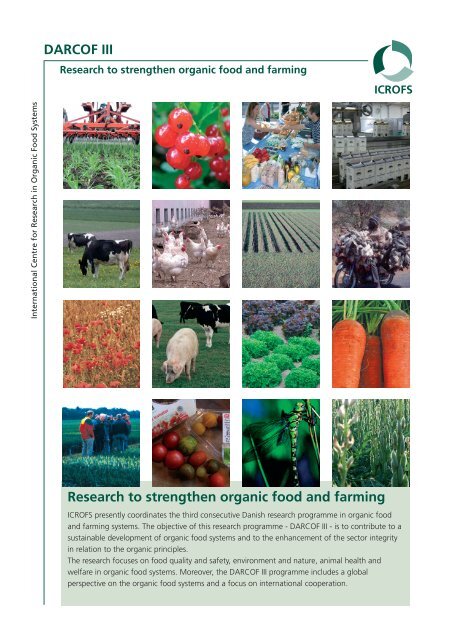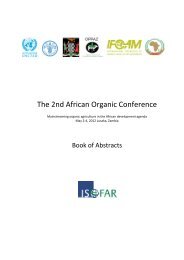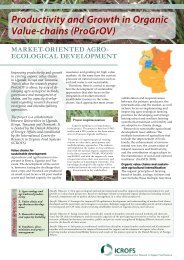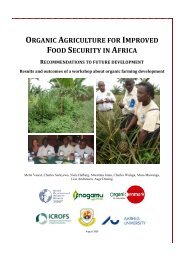darcof iii - ICROFS
darcof iii - ICROFS
darcof iii - ICROFS
You also want an ePaper? Increase the reach of your titles
YUMPU automatically turns print PDFs into web optimized ePapers that Google loves.
DARCOF III<br />
Research to strengthen organic food and farming<br />
<strong>ICROFS</strong><br />
International Centre for Research in Organic Food Systems<br />
Research to strengthen organic food and farming<br />
<strong>ICROFS</strong> presently coordinates the third consecutive Danish research programme in organic food<br />
and farming systems. The objective of this research programme - DARCOF III - is to contribute to a<br />
sustainable development of organic food systems and to the enhancement of the sector integrity<br />
in relation to the organic principles.<br />
The research focuses on food quality and safety, environment and nature, animal health and<br />
welfare in organic food systems. Moreover, the DARCOF III programme includes a global<br />
perspective on the organic food systems and a focus on international cooperation.
The challenge<br />
Consumers expect organic food to be healthy, safe<br />
and of a higher quality than the corresponding<br />
conventional foods. At the same time, some<br />
consumers take it for granted that the production<br />
of organic foods is beneficial to nature, the<br />
environment and to animal welfare.<br />
Thus, in order to promote the sale of organic food<br />
and the conversion to organic farming an important<br />
challenge is to obtain more knowledge on how to<br />
improve the health, safety and nutritional aspects<br />
of organic food. Another challenge is to provide<br />
more knowledge on the sensoric quality aspects of<br />
organic foods. This applies to the raw materials, the<br />
manufacturing process, and the sale and distribution<br />
stages (the final quality). Moreover there is a need<br />
for a better understanding of consumer behaviour,<br />
demands and attitudes towards organic food and<br />
farming.<br />
A high price premium can be a considerable<br />
barrier to the sale of organic products. Therefore,<br />
it is a challenge to develop production methods,<br />
which ensures both the necessary productivity,<br />
competitiveness and a fair profit for the organic<br />
farmers, without compromising on the organic<br />
principles.<br />
Thus, it is crucial that the organic sector maintains<br />
a high level of integrity. Consequently, products<br />
must have been produced and manufactured in<br />
agreement with organic farming objectives, i.e. low<br />
environmental impact, a natural quality, high animal<br />
welfare, and the organic farming principles.<br />
Contribution to a sustainable<br />
development of society<br />
In the years to come, political reforms, trade<br />
agreements and technological developments will<br />
challenge the existing farm structure and change<br />
the overall framework for European farming and<br />
food production. EU and national policies provide an<br />
opportunity to promote multifunctional agriculture<br />
including organic farming. This includes objectives<br />
such as protection of nature and the environment,<br />
a balanced development of rural areas, and<br />
production of sustainable bioenergy as part of farming<br />
systems which also produce high quality food.<br />
Research in these areas should provide knowledge<br />
of the effects of organic farming and food systems<br />
at the production level and knowledge of the<br />
consequences for the entire sector and for society<br />
as a whole. And research should support a further<br />
development of organic food systems, which deliver<br />
high quality food and the positive externalities.<br />
Organic farming in a global perspective<br />
Globalisation can provide benefits for many third<br />
world countries, but for many poor smallholder<br />
farmers it is often difficult to access the technology<br />
and the market, which are the key to the benefits of<br />
globalisation.<br />
Organic agriculture may benefit smallholder farmers<br />
by improving farm productivity based on improved
use of locally available resources, agro ecological<br />
methods, crop diversity and building soil fertility.<br />
Moreover, participation in certified production may<br />
improve farmers’ livelihood by creating market<br />
access and income.<br />
The research<br />
The research is carried out via research programmes<br />
financed by the Danish Ministry of Food, Agriculture<br />
and Fisheries. The international Centre for Research<br />
in Organic Food Systems (<strong>ICROFS</strong> – the former<br />
DARCOF) coordinates research in organic food and<br />
farming in Denmark and internationally.<br />
Organic aquaculture – the linkage between<br />
sustainable production and superior products<br />
(ORAQUA)<br />
Organic cropping systems for vegetable<br />
production – product quality, natural regulation<br />
and environmental effects (VEGQURE)<br />
The viability and stability of demand: The<br />
future outlook for the organic market in<br />
Denmark (CONCEPTS)<br />
Grass-clover in organic dairy farming – options<br />
to reduce costs and improve nutrient utilization<br />
(ORGGRASS)<br />
DARCOF III<br />
The current research programme, DARCOF III,<br />
encompasses the entire organic food chain –<br />
from production in the field and in the stable, to<br />
processing and to the consumers. The aim is to<br />
provide more knowledge about the potential for<br />
enhancing quality and competitiveness of organic<br />
foods and the possibilities for strengthening the<br />
consideration for nature, the environment, animal<br />
welfare and the social conditions in organic<br />
production.<br />
DARCOF III consists of 15 projects with a total<br />
budget of approx. 23 million Euro for the period<br />
2006-2010:<br />
Content, bioavailability and health effects of<br />
trace elements and bioactive components in<br />
organic agricultural systems (ORGTRACE)<br />
Organic milk of high quality – development<br />
of production concepts based on grazing of the<br />
dairy cows and gentle treatment of the milk<br />
during handling and processing (ORMILKQUAL)<br />
Quality and integrity of organic eggs, chicken<br />
meat and pork (QEMP)<br />
Effective control of perennial weeds and<br />
intra-row weeds in organic cropping through<br />
novel technology and new management<br />
strategies (WEEDS)<br />
Increased integrity in organic dairy production<br />
though natural sources of vitamins and minerals<br />
and non-antibiotic heath control (ECOVIT)<br />
High quality seeds – maintaining integrity in<br />
organic farming (SEED)<br />
The effect of cropping systems on production<br />
and the environment (CROPSYS)<br />
The role of organic farms as refugia for<br />
biodiversity (REFUGIA)<br />
Biomass and bio-energy production in organic<br />
agriculture: Consequences for soil fertility,<br />
environment, spread of animal parasites and<br />
socio-economy (BIOCONCENS)<br />
Public policies and demand for organic food: An<br />
international comparison of policy effects and<br />
policy determinants (COP)<br />
Sustainability of organic farming in a global food<br />
chains perspective (GLOBALORG)<br />
On www.icrofs.org you can find links to websites<br />
for each of the individual projects.
Further information<br />
International cooperation<br />
An important task in <strong>ICROFS</strong> is to coordinate<br />
the Danish research in an international context.<br />
Thus, Danish and international research should be<br />
complementary and seek a high level of synergy.<br />
Successful coorporations are established in e.g. the<br />
large EU project QLIF (Improving quality, food safety<br />
and reducing costs in organic and “low input” food<br />
production systems) and the EU ERA-Net CORE<br />
Organic (Coordination of European Transnational<br />
Research in Organic Food and Farming). More<br />
information on these projects is found at www.qlif.<br />
org and www.coreorganic.org.<br />
Homepage<br />
On www.icrofs.org you can find detailed<br />
information about all <strong>ICROFS</strong> research programmes<br />
and research projects. You will also find reports,<br />
articles and newsletters issued as a result of the<br />
research activities.<br />
Open access via Organic Eprints<br />
Publications from the Danish research in organic<br />
food and farming are freely available via the open<br />
access archive, Organic Eprints, located at www.<br />
orgprints.org.<br />
The archive was established by DARCOF in 2002.<br />
Since 2003 it has been operated in cooperation with<br />
the Research Institute of Organic Agriculture, FiBL<br />
in Switzerland and Bundesprogramm Ökologischer<br />
Landbau in Germany.<br />
The archive is open to researchers, students, and<br />
others from all countries. Individual authors deposit<br />
their documents in the archive using the Internet.<br />
Editors ensure the relevance of the publications and<br />
that the minimum quality demands are met. Each<br />
country, or organisation, can choose its own editor;<br />
so far 11 countries have appointed editors.<br />
By June 2008, the archive contained approx. 7.500<br />
publications and it had approx. 9.000 registered<br />
users and 5.000 daily visitors.<br />
Contact<br />
The secretariat of <strong>ICROFS</strong> welcomes contacts from<br />
colleagues, stakeholders and others with interest in<br />
organic food and farming systems. Please contact us<br />
at icrofs@icrofs.org. Contacts can also be directed<br />
to Head of Centre Niels Halberg at niels.halberg@<br />
icrofs.org.<br />
About <strong>ICROFS</strong><br />
The International Centre for Research in Organic Food Systems (<strong>ICROFS</strong>) is a “centre<br />
without walls” where the research is performed in interdisciplinary collaboration<br />
between research groups in different institutions. The centre is an expansion of the<br />
former research centre DARCOF, which the Danish Government in 2008 decided to give<br />
an international mandate and an international board.<br />
<strong>ICROFS</strong><br />
The main purpose of <strong>ICROFS</strong> is to coordinate and monitor international research<br />
in organic food and farming systems in order to achieve optimum benefit from the<br />
allocated resources. Further, the aim of <strong>ICROFS</strong> is to initiate research and create impact<br />
of the research results through support and dissemination of high quality research of<br />
international standard.<br />
More information at www.icrofs.org





